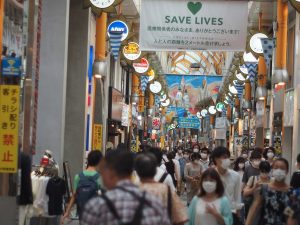The rapid spread of highly contagious variants of COVID-19 has prompted an extension of the current state of emergency in Tokyo, Osaka, Kyoto, and neighboring Hyogo prefecture until the end of May.
A third state of emergency in the capital was issued on April 25, targeting the Golden Week three-day national holiday. It was scheduled to end on May 11. However, a fourth wave of infections shows no sign of abating, with the spread of infections exceeding the peak of the third wave late last year. Tokyo recorded a seven-day average of 637 new daily cases and the largest figure of 1,050 cases on May 1.
The rapid spread of coronavirus in Osaka in early April forced local authorities to cancel the Osaka leg of the Olympic Torch relay. But one month on, local hospitals are overwhelmed, and for the first time all hospital beds designated for seriously ill patients are occupied.
The minister in charge of the country’s COVID-19 response, Nishimura Yasutoshi, said Osaka was in a critical situation and warned Tokyo could face a similar scramble for hospital beds in the next two weeks unless the infection rate is brought down.
The Tokyo Metropolitan Government fears the rapid spread of coronavirus is being driven by mutant strains. There are concerns that the original virus will be replaced by the N501Y strain. In Tokyo 62 percent of 521 new daily cases reported on May 6 were of the N501Y strain and five cases of the Indian strain were also detected. Osaka is said to be battling the spread of the U.K. variant. At this stage, variants from South Africa, Brazil, and the Philippines have turned up in Japan. To make matters worse, the government has warned of the emergence of a “double mutant” variant that carries similar characteristics to the two strains currently raging in India.
In Japan the spread of these highly contagious variants is escalating among young people and the working aged population. The number of critically ill young people requiring oxygen, artificial respirators, or intensive care is on the rise and reached the highest national total of 1,114 cases on May 6. Currently, 61,716 people are being treated for COVID-19 across Japan and 10,712 people have died as a result of the virus so far.
The Japan Medical Association stressed that “the situation is grave because the infection is spreading very rapidly.” Tokyo Governor Koike Yuriko told reporters on May 6 that the situation in the capital has not improved.
However, on May 7 Prime Minister Suga Yoshihide pointed out at a task force meeting that since the start of the state of emergency the flow of people between Tokyo and Osaka has started to slow down, indicating that the countermeasures are starting to have an effect. When asked about uncertainty surrounding the upcoming Olympics Games, Suga replied that “Unless the IOC decides to cancel the Tokyo Olympics and Paralympics, the Japanese government will continue its efforts to host the Games.”
With less than three months until the Tokyo Summer Olympics, Pfizer’s offer to donate vaccines to athletes and staff was welcomed by the IOC despite Britain and Japan not wanting to guarantee their athletes priority doses so as not to “skip the queue.” However, experts have raised concerns that the rampant spread of mutant variants could reduce vaccine efficacy.
The government hopes to rein in the surge of coronavirus infections by continuing to ask restaurants to stop serving alcohol entirely and reduce business hours to close by 8 p.m. In response to the spread of COVID-19 clusters in the workplace, Suga said he aimed to reduce the number of employees commuting to work by 70 percent.
Meanwhile, Japanese nationals and residents returning from India and other countries will also be asked to stay in a hotel for six days as a way to tackle the spread of mutant variants.
In addition, in popular entertainment districts across Tokyo, such as Shibuya, shops and buildings have been asked to turn off their neon lights after 8 p.m. to discourage drinking and meandering on the street.

































